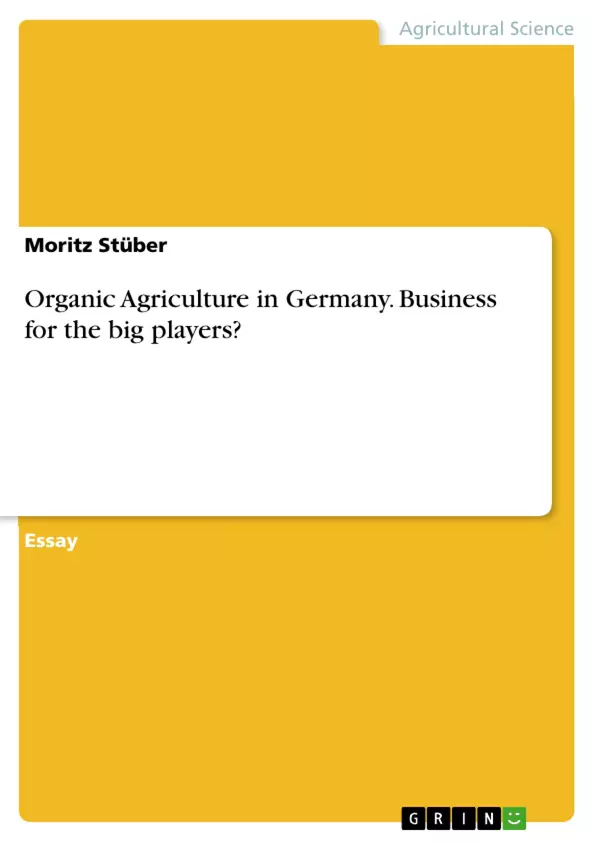The history of organic agriculture (OA) in Germany is not only based on the lectures of its founder Rudolf Steiner. OA in its present status as a developed economic branch is far more, for example the result of ecological and political movements against globalisation and intensification in the 70’s (rise of the “Greens”). Economic and environmental failure, as in the 1973 oil crisis or agricultural chemical-technical intensification led to a deepening of environmental topics and social acceptance. With these societal changes, the basis for an ecologically and socially fair production was set. New political structures and decisions in the late 80’s and early 90’s boosted OA in Germany. Eastern German organic farmers restructured and enforced themselves to an enhancement of German agriculture, after the Wall Fall 1989. The EU-regulation on organic farming in 1991, decisively shaped the structure and turned OA to a lucratively subsidised business. In the following years until today, OA in Germany was
skyrocketing in farming and production, as well as in consumption. From a niche product in the 80’s to economic importance in the new millennium, organic products entered the mainstream market. Today, Germany is Europe’s biggest organic consumer and its fourth biggest organic producer. The demand for organic products is exceeding national supply, therefore Germany is also the second biggest importer of organic products. Wholesaler, conventional food retailer and organic retail chains realised the market value of organic products. Thanks to conventional super markets, organic products are now obtainable everywhere. Organic retail chains, such as
“Alnatura” or “Denn’s” are still expanding, opening new branches and increasing their assortment. Individual organic food stores and direct marketing are not holding the upward trend and getting displaced by organic retail chains. The difference between conventional and organic food retailers is shrinking. At the same time, consumer behaviour is leaning towards organic products, but still with the conventional point of view of cheapness and convenience. These double standards are symptom and evidence of a fully developed organic market. Organic products found their place in German society, not because of a complete understanding of original ideals, but rather because of the alignment of OA towards the consumer’s behaviour.
Inhaltsverzeichnis (Table of Contents)
- Prelude
- Introduction and questioning
- General overview of Organic Agriculture in Germany
- Present status
- Role in the global market
- History and Food Regime Theory
- Relation of history and present time
- Conclusion
- References
Zielsetzung und Themenschwerpunkte (Objectives and Key Themes)
This essay examines the organic food and agriculture market in Germany, focusing on its history, present status, and role within the global market. It explores how the market has evolved and how it relates to the concept of Food Regime Theory (FRT). The essay also considers the ethical and economic challenges posed by the increasing influence of conventional supermarkets on the organic sector.
- The evolution of organic agriculture in Germany from its origins to the present day
- The relationship between organic agriculture and the Food Regime Theory (FRT)
- The influence of conventional supermarkets on the organic market
- The ethical and economic challenges facing the organic sector
- The potential for growth in the organic market in Germany
Zusammenfassung der Kapitel (Chapter Summaries)
- Prelude: This chapter provides a brief introduction to the essay's focus, highlighting the importance of organic agriculture in Germany and its relevance to global food and agriculture markets.
- Introduction and Questioning: This chapter discusses the context of organic agriculture in Germany, examining the role of consumerism and imported goods in shaping the market. It also introduces the origins of organic agriculture in Germany, highlighting the discrepancy between its original principles and its current state.
- General overview of Organic Agriculture in Germany: This chapter provides an overview of the current state of organic agriculture in Germany. It discusses the growth of the organic market, the distribution of organically farmed land, and the prevalence of organic certification bodies.
- Present Status: This chapter examines the current status of the organic food and agriculture market in Germany, including the growth of organically managed land, the distribution of organic products, and the increasing influence of conventional supermarkets.
Schlüsselwörter (Keywords)
The essay focuses on keywords such as organic agriculture, Food Regime Theory (FRT), conventional supermarkets, organic certification bodies, consumer behavior, ethical considerations, and economic strategies within the context of the German organic food and agriculture market.
Frequently Asked Questions
How has organic agriculture evolved in Germany?
It started with Rudolf Steiner's lectures and grew through ecological movements in the 70s. Since the 1990s, EU subsidies and the entry of conventional supermarkets have turned it into a mainstream economic sector.
What is Germany's role in the global organic market?
Germany is Europe's largest consumer and fourth-largest producer of organic products. Because demand exceeds national supply, it is also the second-largest importer of organic goods worldwide.
What is the "Food Regime Theory" (FRT)?
FRT is used to analyze the structural changes in the global food system, showing how organic food has moved from a niche, idealistic movement to a lucrative, corporate-driven business.
How have supermarkets changed the organic sector?
Conventional supermarkets have made organic products accessible everywhere but have also led to price pressure and a shift away from the original small-scale, fair-trade ideals of the movement.
What are "organic retail chains"?
Chains like "Alnatura" or "Denn’s" specialize exclusively in organic products and are expanding rapidly, often displacing smaller, independent organic health food stores.
- Quote paper
- Moritz Stüber (Author), 2017, Organic Agriculture in Germany. Business for the big players?, Munich, GRIN Verlag, https://www.grin.com/document/444908



